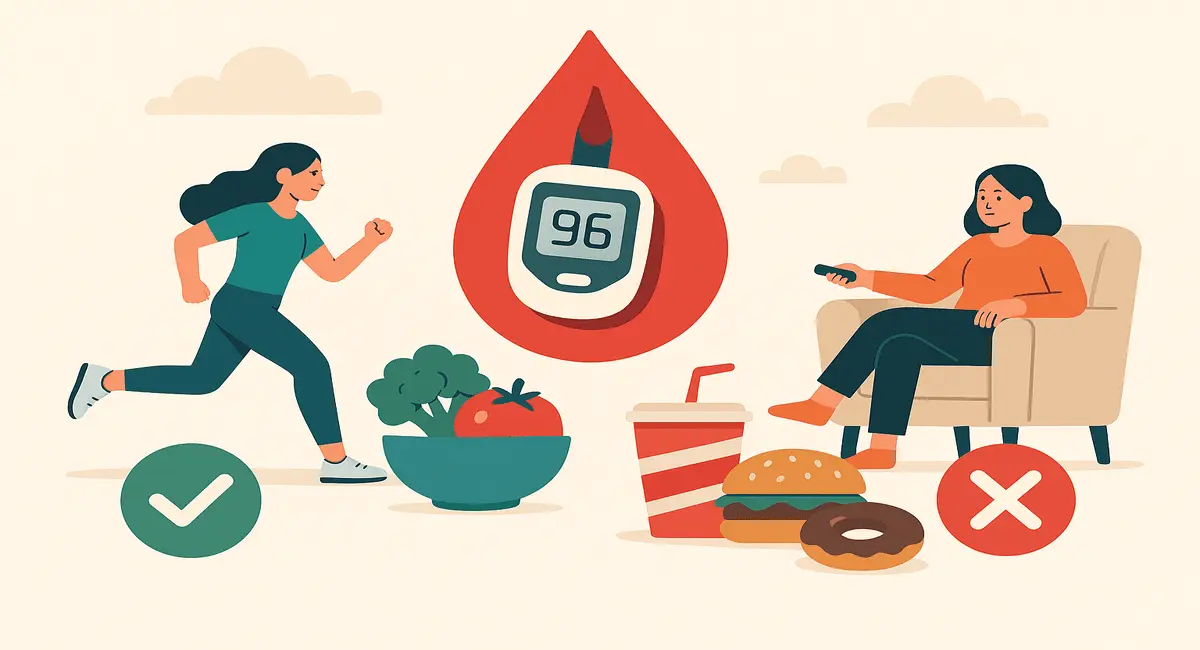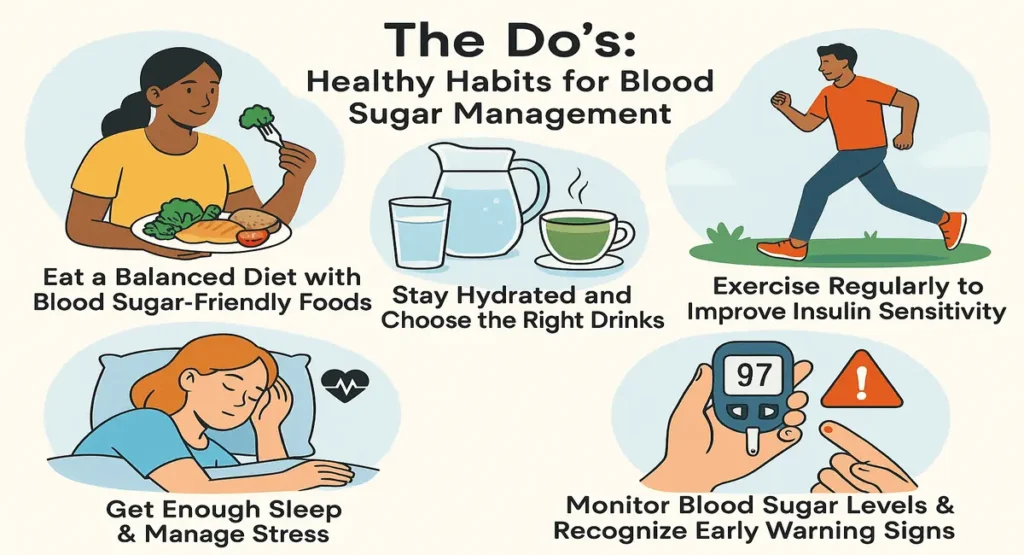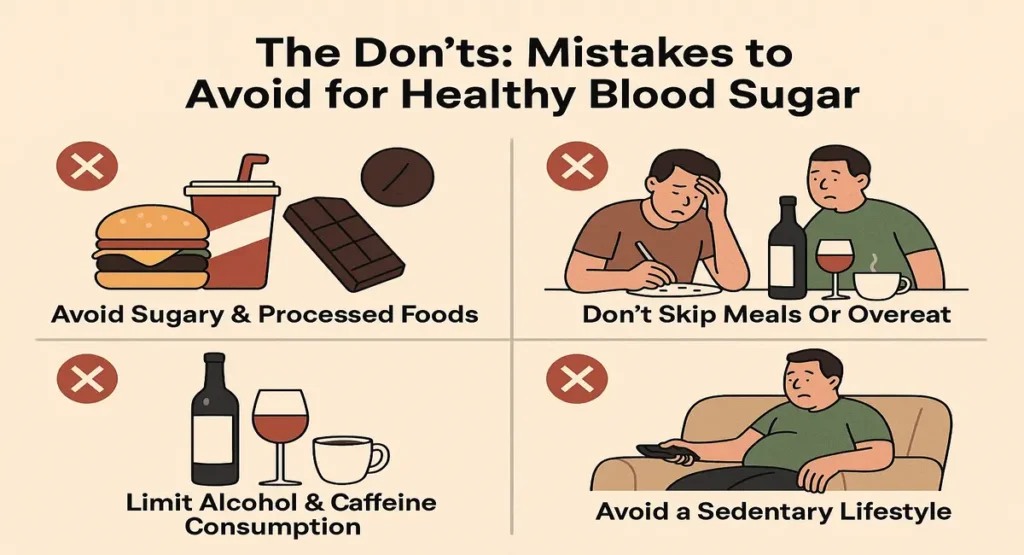It’s important to keep your blood sugar levels stable so you can stay healthy and have consistent energy all day long. The primary source of energy for the cells in your body is glucose, which is commonly referred to as blood sugar. But when your blood sugar levels spike too high or drop too low, it can cause serious health problems, including fatigue, mood swings, sugar cravings, weight gain, and long-term conditions like type 2 diabetes.
In this expert-backed guide, you’ll discover the key dos and don’ts of effective blood sugar management. Whether you’re trying to prevent diabetes, control prediabetes, or improve your energy and well-being, these practical tips will help you make wise, sustainable choices. This guide uses proven research to help you build healthy habits step by step so that you can take control of your well-being in everyday life.
Table of Contents
A Comprehensive Guide to Blood Sugar
Before diving into the strategies for managing blood sugar, it’s essential to understand what blood sugar is and how it affects your body.

What Is Blood Sugar?
Blood sugar, which is also called glucose, is the main form of sugar that your body carries in the blood to use for energy. It comes mainly from the carbohydrates in the food you eat, such as bread, fruits, and rice. After digestion, these carbs are broken down into glucose, which your body uses as its primary energy source.
A hormone named insulin, produced by the pancreas, helps move this glucose from your blood into your cells, where it’s turned into energy. Maintaining your blood sugar level steady is essential for staying healthy, feeling alert, and staying busy.
Why Is Blood Sugar Management Important?
Maintaining your blood sugar at a healthy level is essential for feeling good now and staying healthy in the future. When glucose levels in your blood remain within a healthy range, your body works smoothly—you feel energized, focused, and emotionally balanced. When your blood sugar gets too high or too low, it can cause problems with how your body works.
In the short term, blood sugar imbalances can cause symptoms like:
- Low energy and tiredness, even after eating.
- Mood swings and irritability
- Difficulty concentrating or mental fog
- Intense cravings for sugary or high-carb foods
Over time, consistently poor blood sugar control can contribute to severe health conditions, such as:
- Unwanted weight gain and stubborn belly fat
- Insulin resistance happens when your body’s cells don’t respond appropriately to insulin, making it harder for sugar to get into the cells and be used for energy.
- Prediabetes is an early warning sign of potential diabetes.
- Type 2 diabetes is a chronic health condition that lasts over time where your body has trouble using sugar (glucose) from your blood the right way.
Keeping your blood sugar stable isn’t just about avoiding illness—it’s about maintaining steady energy, a clear mind, and a strong, healthy body every day.
How Blood Sugar Imbalances Occur?
High Blood Sugar (Hyperglycemia)
High blood sugar, also known as hyperglycemia, occurs when there is an excess of sugar (glucose) in the bloodstream. This usually happens when your body doesn’t produce enough insulin or when your body cells do not respond to insulin appropriately—a condition known as insulin resistance.
High blood sugar is a common issue for people with type 2 diabetes and can be triggered by factors such as a high-sugar diet, lack of physical activity, stress, or certain medications. If not managed, it can cause long-term health issue, such as nerve damage, kidney issues, and heart disease.
Low Blood Sugar (Hypoglycemia)
Low blood sugar is called hypoglycemia, occurs when your blood sugar levels fall below normal. This usually happen if you skip meals, spend too long without eating, engage in intense physical activity without proper fueling, or take too much insulin or other blood sugar-lowering medications.
It can cause symptoms like dizziness, shakiness, sweating, confusion, and in severe cases, fainting. It’s important to recognize these signs early and treat them quickly to avoid serious consequences.
The Do’s: Healthy Habits for Blood Sugar Management
Taking control of your blood sugar starts with building consistent, healthy habits. A positive lifestyle change can help you maintain stable glucose levels, maintain a healthy energy level, and reduce your risk of diabetes-related complications. These practices are proven to improve your daily health and well-being over the long term.
1. Eat a Balanced Diet with Blood Sugar-Friendly Foods
The foundation of blood sugar management is a well-balanced diet. Foods that gradually release glucose into your bloodstream are essential for preventing sudden spikes and crashes of blood sugar.
- Fiber-Rich Foods: Fiber helps slow down digestion and the absorption of glucose. Make sure to include lots of non-starchy veggies like broccoli, spinach, and zucchini, along with legumes and whole grains like quinoa and oats in your diet.
- Protein and Healthy Fats: These vital nutrients help keep your blood sugar levels balanced. Opt for lean proteins (chicken, fish, tofu) and healthy fats (avocado, nuts, olive oil).
- Low-Glycemic Index (GI) Foods: Foods with a low glycemic index, such as berries, sweet potatoes, and lentils, are great options for keeping your blood sugar levels stable.
Common Mistakes to Avoid: Skipping meals, overloading on refined carbs, or relying on processed snacks can disrupt blood sugar balance. Instead, plan meals that combine fiber, protein, and healthy fats.
2. Stay Hydrated and Choose the Right Drinks
Staying hydrated is something we often forget about, but it’s actually really important for keeping our blood sugar levels in check. Drinking water helps your kidneys remove extra glucose through urine, which also helps prevent spikes caused by dehydration.
- Best Beverages: Water is the gold standard. Herbal teas and unsweetened almond milk are also great options.
- Worst Beverages: Sugary sodas, energy drinks, and fruit juices can cause rapid blood sugar spikes. Excessive caffeine intake over time may play a role in developing insulin resistance.
Pro Tip: If plain water feels boring, infuse it with lemon, cucumber, or mint for a refreshing twist.

3. Exercise Regularly to Improve Insulin Sensitivity
Regular exercise is a great way to keep your blood sugar in check and boost your overall health. It helps your muscles use glucose more efficiently, which improves how your body responds to insulin and lowers blood sugar levels.
Types of Exercise:
- Aerobic Exercise: Walking, jogging, or cycling can help lower blood sugar levels.
- Strength Training: Building muscle mass improves your body’s ability to regulate glucose.
- Yoga: Combines physical activity with stress reduction, making it a double win for blood sugar management.
Post-Meal Exercise: A 10-15 minute walk after meals can significantly reduce blood sugar spikes by encouraging glucose uptake by muscles.
4. Get Enough Sleep & Manage Stress
Sleep and stress can significantly affect your blood sugar levels. Poor sleep increases insulin resistance, while chronic stress raises cortisol levels, which can lead to elevated blood sugar.
- Sleep Tips: Try to get between 7 to 9 hours of restful sleep every night for optimal health and well-being. Create a calming bedtime ritual, avoid screens before sleep, and keep your room cool and dark for a better rest.
- Stress Management: Consider adding mindfulness activities to your daily routine, such as meditation, deep breathing, or journaling. Even just a few minutes of calm each day can make a big difference!
5. Monitor Blood Sugar Levels & Recognize Early Warning Signs
Keeping track regularly helps you see how your body reacts to various foods, activities, and stress.
- Fasting Blood Sugar: Ideally between 70-100 mg/dL.
- Post-Meal Blood Sugar: Should stay below 140 mg/dL.
Early Warning Signs: Fatigue, frequent urination, excessive thirst, and brain fog may indicate blood sugar imbalances.
The Don’ts: Mistakes to Avoid for Healthy Blood Sugar
Healthy habits can help control your blood sugar, but common mistakes can cause it to spike or crash. Knowing what to avoid can help you make better choices and prevent future health problems. Here are some key behaviors to steer clear of for balanced blood sugar and better health.
1. Avoid Sugary & Processed Foods
Refined carbs and sugary foods are the biggest culprits behind blood sugar spikes.
- Hidden Sugars: Many packaged foods contain hidden sugars under names like high-fructose corn syrup, dextrose, and maltose. Always read labels carefully.
- Healthy Swaps: Choose whole fruits instead of sugary desserts and opt for whole-grain options over refined carbs.
2. Don’t Skip Meals or Overeat
Skipping meals or irregular times can seriously mess with your blood sugar levels.
- Meal Timing: Eat small, balanced meals every 3-4 hours to maintain steady glucose levels.
- Dangers of Extreme Dieting: Crash diets can disrupt insulin sensitivity and worsen blood sugar control.

3. Limit Alcohol & Caffeine Consumption
Both alcohol and caffeine can negatively impact blood sugar.
- Caffeine: Excessive intake can lead to insulin resistance. Try to keep your coffee consumption to just one or two cups a day for a balanced and healthy consumption.
- Alcohol: Causes initial spikes and subsequent crashes. Moderation is key—limit yourself to one drink per day.
4. Avoid a Sedentary Lifestyle
Sitting for long periods slows glucose metabolism and increases the risk of insulin resistance.
- Simple Habits: Take short walks, stretch every hour, or try using a standing desk to keep moving and stay active all day long.
Natural Supplements for Blood Sugar Support
Along with making lifestyle changes, natural supplements can also offer extra support for managing blood sugar levels. Ingredients like gymnema, chromium, and cinnamon extract have been clinically researched and shown to help regulate glucose balance and improve insulin sensitivity.
Why Choose Gluco6?
Gluco6 is a natural supplement that combines these potent ingredients into one formula. It’s designed to:
- Support healthy blood sugar levels.
- Enhance insulin sensitivity.
- Promote overall metabolic health.
“Looking for extra support? Try Gluco6 today and experience the benefits of clinically proven ingredients!”
We recommend users always contact a healthcare professional before taking any medicines or supplements.
FAQs: About Blood Sugar Management
Can I Reverse High Blood Sugar Naturally?
Yes, lifestyle changes like a balanced diet, regular exercise and managing stress can play a key role in reversing prediabetes and manage type 2 diabetes.
How Quickly Can I Lower Blood Sugar?
Immediate strategies include drinking water, engaging in light exercise, and eating a balanced meal with protein and fiber.
What Are the Early Symptoms of Blood Sugar Imbalance?
Look out for fatigue, cravings, brain fog, frequent urination, and excessive thirst.
Do Supplements Really Help with Blood Sugar?
Yes, ingredients like berberine, chromium, and cinnamon extract have scientific backing for their blood sugar-regulating properties.
Final Thoughts on Glucose Control
Managing blood sugar requires a lifetime commitment and a commitment to healthy habits. If you follow the guidelines outlined in this guide-such as eating a balanced diet, staying active, and prioritizing sleep-you can maintain stable blood glucose levels and minimize the risk of complications. Over time, small changes that you can keep up, like eating low-glycemic foods, working out daily, and keeping an eye on your levels, can make a big difference.
For added support, consider natural supplements like Gluco6, which contains clinically researched ingredients like berberine, chromium, and cinnamon extract. These ingredients assist in balancing blood sugar levels and enhancing insulin sensitivity, making Gluco6 a great addition to your health routine.
“Ready to take control of your blood sugar? Try Gluco6 today and start your journey to better health!”
We recommend users always contact a healthcare professional before taking any medicines or supplements.
Sources:
At Make Human Healthy, we are committed to providing accurate and reliable health information. We ensure that all content is backed by scientific research, peer-reviewed studies, and credible health organizations. Our resources are carefully selected to maintain the highest standards of integrity, transparency, and reliability, so you can trust the information we provide
Mayo Clinic:- Diabetes management: How lifestyle, daily routine affect blood sugar – https://www.mayoclinic.org/diseases-conditions/diabetes/in-depth/diabetes-management/art-20047963
American Diabetes Association:- Blood Glucose and Exercise – https://diabetes.org/health-wellness/fitness/blood-glucose-and-exercise
Archana Batra:- Dos and don’ts for better blood sugar management – https://www.dtarchanabatra.com/posts/dos-and-donts-for-better-blood-sugar-management
Healthline:- 14 Easy Ways to Lower Blood Sugar Levels Naturally – https://www.healthline.com/nutrition/14-ways-to-lower-blood-sugar
CDC:- Manage Blood Sugar – https://www.cdc.gov/diabetes/treatment/index.html
American Heart Association:- Life’s Essential 8™ – How to Manage Blood Sugar Fact Sheet – https://www.heart.org/en/healthy-living/healthy-lifestyle/lifes-essential-8/how-to-manage-blood-sugar-fact-sheet
MedlinePlus:- Blood Glucose – https://medlineplus.gov/bloodglucose.html
National Library of Medicine:- Blood Glucose Monitoring – https://www.ncbi.nlm.nih.gov/books/NBK555976/
Affiliate Disclosure: his post may contain affiliate links. If you make a purchase through these links, I may earn a small commission at no extra cost to you. This helps support the blog and allows me to continue creating helpful content. Thank you for your support!
This content is written by Dr. Arshi Thakur. If you found this content helpful, please consider sharing it on your social media to help others benefit from it!
Please note: Our website services, content, and products are for informational purposes only. Make Human Healthy does not provide medical advice, diagnosis, or treatment.
